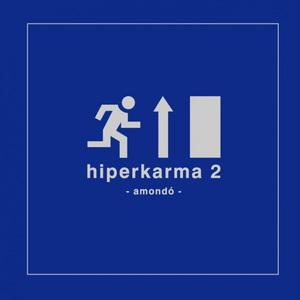After some minor changes in lineup, the lineup consists of Bérczesi Róbert on guitar and providing vocals; Frenk (Torma Gábor) on drums and providing backing vocals; Laca (Varga László) on bass guitar; FX (Bacsa Gyula) on keyboard; and Stevenson (Kis Tibor) on guitar. Long-time percussionist Zacsi (Zaják Péter) left the band in 2007.
The second album of the band, Amondó, was released in 2003, this time not a one-man production, but with the full band playing music.
The band is about the split up, and their last concert until at least Spring 2008 will be held on 31 October 2007, as part of the 6th annual Hiperkarma Halloween event. Hiperkarma might release their third album in 2008.
secperc
hiperkarma Lyrics
Jump to: Overall Meaning ↴ Line by Line Meaning ↴
Mikor azt mondod, hogy fáj, mondd, mire is gondolsz pontosan?
Tudom a fájdalomnak tépett arca van, azt nézzük unos-untalan mindannyian.
Mikor azt látod, hogy nem figyelnek rád,
Csak a saját orrod látod, ha folyton magadat keresed másokon,
Van, aki elidőzik azon a tépett arcodon, megbánja később még nagyon.
Ne hidd, hogy nem sokáig húzod!
Mikor elhitted, hogy szerencsétlen vagy,
Mikor elhitted, hogy véged van, mondd, miért nem álltál ellen semminek?
Azt hitted, rosszabb nem jöhet, pedig még könnyű volt neked.
Legalábbis ennél könnyebb.
The lyrics of Hiperkarma's "Secperc" reflect on the human experience of struggle, pain, and the tendency to focus on oneself amidst hardship. The song begins by acknowledging the feeling of being far away from home, and asks what exactly it is that hurts. The singer realizes that pain has a universal face that everyone sees all too often. When it seems like no one is paying attention to one's pain, the tendency is to become self-absorbed and to project one's own problems onto others. However, the song reminds us that there are people who do stop and take notice of the pain in one's face, and regret not doing so sooner.
As the song progresses, the lyrics shift to address the self-doubt and defeat that comes with believing that one is unlucky. There is a sense of resignation, but the singer wonders why this has to be the case. Why do people not fight back when they are faced with hardship? Why do we believe that things cannot get worse, when in reality, there is always potential for things to go wrong? The lyrics call on listeners to not think that they can easily overcome their struggles, nor to believe that their hardship will be short-lived.
Overall, the lyrics of "Secperc" illustrate the human experience of dealing with pain and hardship, and the tendency to become self-involved in the process. The song reminds us that sometimes it takes others noticing our pain to truly heal, and that we must be ready to fight for ourselves and not just resign ourselves to our suffering.
Line by Line Meaning
Mikor azt mondod, hogy messziről jöttél,
When you say you came from far away,
Mikor azt mondod, hogy fáj, mondd, mire is gondolsz pontosan?
When you say it hurts, tell me exactly what you're thinking?
Tudom a fájdalomnak tépett arca van, azt nézzük unos-untalan mindannyian.
I know pain has a torn face, we all look at it all the time.
Mikor azt látod, hogy nem figyelnek rád,
When you see that no one is paying attention to you,
Csak a saját orrod látod, ha folyton magadat keresed másokon,
You only see your own nose if you're constantly looking for yourself in others,
Van, aki elidőzik azon a tépett arcodon, megbánja később még nagyon.
Someone might dwell on that torn face of yours, and later regret it very much.
Ne hidd, hogy ennyivel megúszod!
Don't think you'll get away with just this much!
Ne hidd, hogy nem sokáig húzod!
Don't think you won't suffer for long!
Mikor elhitted, hogy szerencsétlen vagy,
When you believed that you're unlucky,
Mikor elhitted, hogy véged van, mondd, miért nem álltál ellen semminek?
When you believed it's over, tell me why didn't you resist anything?
Azt hitted, rosszabb nem jöhet, pedig még könnyű volt neked.
You thought it couldn't get any worse, but it was still easy for you.
Legalábbis ennél könnyebb.
At least, easier than this.
Contributed by Joseph D. Suggest a correction in the comments below.
